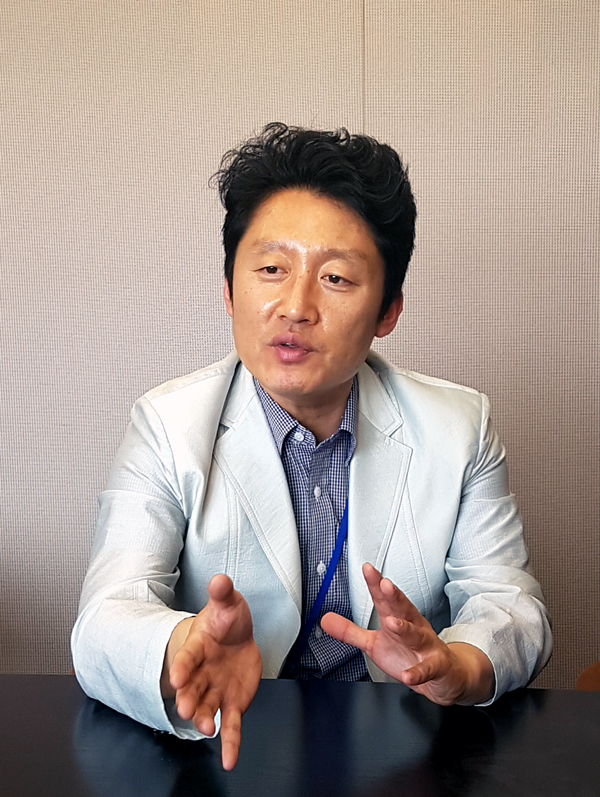“Pharmacologists are matchmakers”… The Society of Pharmacology activel…
페이지 정보
본문
“Pharmacologists are matchmakers”… The Society of Pharmacology actively participates in the development of innovative new drugs.
[Interview] The Korean Society of Pharmacology Chan-Young Shin, Chairman of Academic Affairs, Song-Jin Lee, Chairman of Pharmaceutical Pharmacology
“Pharmacologists are brokers and go-betweens who connect the stages of new drug development. In a word, pharmacologists are match makers in drug development.”
At the Spring Workshop of the Korean Society of Pharmacology held on the 26th at the Sejong University Convention Center, Academic Chair Chan-Young Shin (Konkuk University) and Director of Pharmaceutical Pharmacology Lee Song-jin (CJ Healthcare) expressed this about the role of pharmacologists in new drug development.
Industry as well as academia are rolling up their sleeves to develop first-in-class, the biggest topic in the domestic pharmaceutical industry. A representative field is pharmacology, and the Korean Society of Pharmacology created the Pharmaceutical Pharmacology Committee within the society this year to actively promote communication between industry and academia. As if reflecting this atmosphere, a large number of executives from top domestic pharmaceutical companies, including Yuhan Corporation, Dong-A ST, Boryung Pharmaceutical, and Dongwha Pharmaceutical, attended the spring workshop with the theme of “Pharmacological Suggestions for Successful New Drug Development in Korea,” showing interest.
-This year's conference focused on new drug development. The role of pharmacologists in drug development.
(Shin Chan-young) Until now, there has been a perception that pharmacology is necessary only in the early stages of new drug development. However, pharmacology includes both toxicology and clinical fields. Most pharmacologists are good at toxicology and have a lot of preclinical and clinical experience. It is the pharmacologist who is in the right position to connect each stage of development.
In short, pharmacologists play a very important role as matchmakers in the development of new drugs. The spring workshop also went through A to Z for new drug development, and tried to think about what role a pharmacologist could play as an intermediary in the process.
(Lee Song-jin) Until now, companies had little interest in pharmacology, and participation in academic conferences was low. An important basis for new drug development is drug efficacy, and toxicity tests must also be passed. In this process, it is necessary to know pharmacology to interpret whether the toxicity is caused by the compound or the pharmacological action. The same goes for how much it affects the human body. Until now, awareness of this aspect has been insufficient. In order to develop innovative new drugs, the status of pharmacology needs to be reestablished.
-Industry, government, and academia are all talking about new drug development, but cooperation doesn't seem to work well.
(Shin Chan-young) That's right. Academics are dissatisfied with each other, and industries are dissatisfied with the lack of a pipeline. Although the government is carrying out various support projects, it is necessary to review (such as whether the support projects are proceeding well). It is the role of the pharmacological society to coordinate each of these positions and situations. Researchers often misunderstand the results of their long-term research with companies in the process of previous coordination.
For example, you get angry when you suggest a cost of 100 million won for the results of a 10-year study. We need a meeting place where we can understand each role. The Pharmacological Society will do that. As understanding increases (between industry, academia and research), open innovation will become more active.
- The Korean Society of Pharmacology has created various committees this year, and the establishment of the Pharmaceutical Pharmacology Committee stands out in particular.
(Lee Song-jin) The goal is to create a foundation for the convergence of academics and business. A total of six members, including myself, include Dong-A ST, Yuhan Corporation, Anguk Pharm, and Hyundai Pharm. The priority is to seek opportunities with academia and venture companies, and to attract interest in new drug development. In the second half of the year, we are considering holding a workshop on a topic that can connect venture companies and companies.
It is also important that decision makers other than practitioners know the importance of pharmacology. Domestic pharmaceutical companies have tried Me Too new drugs, but are afraid of first-in-class development. They are questioning whether the company is truly capable of developing innovative new drugs. In the future, we will address these questions and discuss what direction the various fields will go.
-Efforts were made to connect academia and industry, but the results were not good. Does the Society of Pharmacology intend to play an incubating role for the development of innovative new drugs?
(Lee Song-jin) The role of an incubator should be played by companies with money. The society serves as a venue for gatherings of people from various fields. If you stay at a company for a long time, you can't participate in academic conferences because you are devoted to research, and if you do, you lose your sense. Up-to-date knowledge is achieved through the network. I plan to be more active in that role. Korea will make efforts to create opportunities for innovative new drug development.
- What is the society's plan for new drug development?
(Shin Chan-young) Pharmacologists participate in new drug development programs at Stanford University and Harvard University. These schools are self-supporting for the basic target. A committee composed of experts in each field, including pharmacology, conducts research, collects data, and organizes patent rights.
After two years of incubation, 56% of research materials enter the next stage. This is an incredibly high probability. In addition, 20% of them succeed until the commercialization stage. Of course, this is partly due to the high basic capabilities of researchers, but there are no companies or schools in Korea that can do this. In Korea, academic societies should play such a role.
We will hold workshops, etc. so that researchers in the field of basic research can move on to the next step, and play the role of 'facilitator' of new drug development by connecting them.

